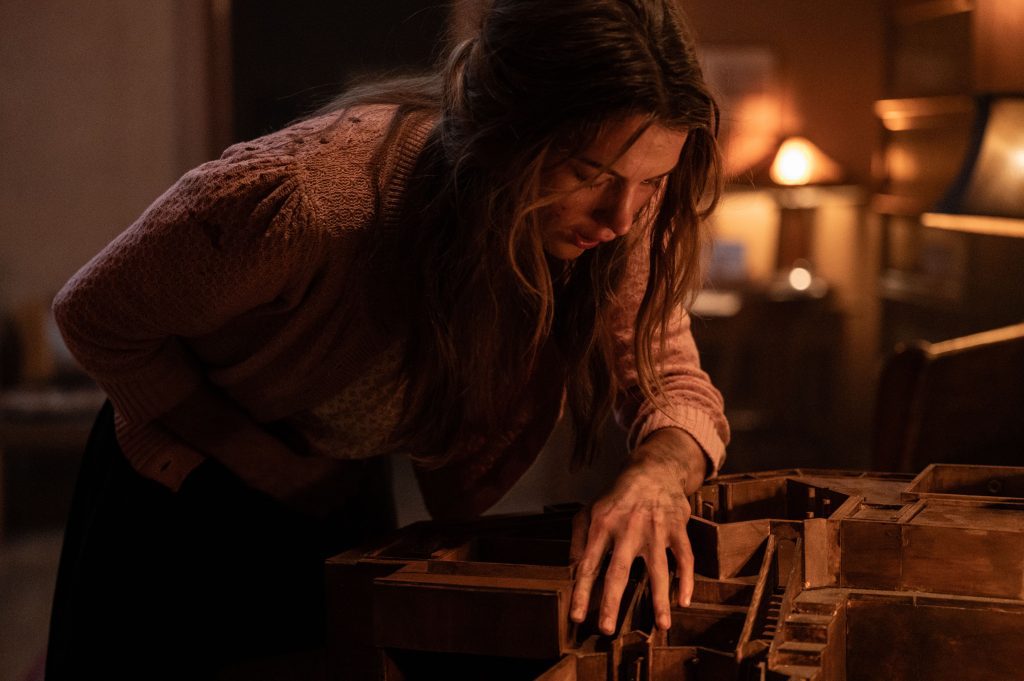Religion has always been an inspiration for horror. You can’t have god without the devil, good without evil. The Exorcist, The Omen, Apostle; there are any number of horror films that bring the horrors of hell to the mortal world. Heretic is a horror film that doesn’t focus on one specific religion but makes audiences question religion in general. After all, it is people themselves who use religion to justify their own actions, for good or bad. Compelled by terrifying performances from Hugh Grant, Sophie Thatcher, and Chloe East, Heretic focuses more on cerebral and philosophical horror rather than typical jump scares. While its words don’t always land, they do manage to embed deep enough into your mind to reaffirm your faith in horror.
Sister Barnes and Sister Paxton are missionaries for the Church of Jesus Christ of Latter-day Saints and arrive at the quaint house of Mr. Reed as he has previously expressed interest to learn more about their religion. Soon after they arrive, however, Mr. Reed increasingly makes them more and more uncomfortable with a fake blueberry pie smell, no Mrs. Reed, and a claim that he has found the one true religion and that all others are just mere iterations of it. Their fears culminate when Mr. Reed locks the front door and leads them to the back of the house with two choices of exit; a door marked Belief and one marked Disbelief. Not knowing whether either door truly leads to the outside, Sister Barnes and Paxton will have to put their faith in Mr. Reed’s words in order to survive.
Heretic is a fascinating exploration on the influence of religion and its impact on others. Hugh Grant is genuinely creepy as he lures these innocent ladies into his house and slowly leads them deeper and deeper into his twisted game. He says that they can leave at any time and that he’s been truthful with them, but his actions say differently. He has carefully controlled every element of his experiment and Sister Barnes and Paxton are at his mercy, no matter what they make think. It’s a terrifying game of cat and mouse.

What makes the film scary is in the conversations between Hugh Grant and Sophie Thatcher and Chloe East on religion. It’s clear that Grant has an ulterior motive from the start, so his nice guy façade helps build the tension as you wonder at what moment is he going to spring his trap. The nature of their conversations is interesting as well. He confronts their belief, explaining how various religions share many of the same similarities. What makes any one religion the correct one? It’s here where I wish the film would have gone deeper and explored the idea of organized religion. Heretic is heavy on the dialogue, but the message feels quite light. Grant says a lot and says it well, but there just isn’t a lot of substance to his words. In that regards, the heretic title rings quite true.
It’s interesting to note that the Belief and Disbelief door both lead to the same room down in the basement. It’s once Barnes and Paxton get here that Heretic moves towards more traditional horror scares. There aren’t a lot of them, but they’re quite effective, especially because of the film’s use of sound design. So whether or not you’re a fan of physical or psychological horror, Heretic delivers elements of both.
Heretic is a solid addition to the horror genre. Its performances are more memorable than any of the scares it produces, but it tickles the mind and makes you think in ways that are outside of the box. If you’re a fan of the genre, you won’t be disappointed.
-
Heretic
Summary
Compelled by terrifying performances from Hugh Grant, Sophie Thatcher, and Chloe East, Heretic focuses more on cerebral and philosophical horror rather than typical jump scares. While its words don’t always land, they do manage to embed deep enough into your mind to reaffirm your faith in horror.







